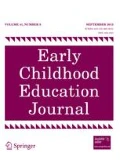Abstract
This article synthesized science instruction studies with preschool and kindergarten children to understand the magnitude of science instruction’s impact on young children’s vocabulary outcomes. A total of seven studies that met criteria for the synthesis and provided sufficient data for the calculation of effect size were included. Science instruction has been examined using science intervention and vocabulary intervention with a focus on science. The overall mean effect size was moderate (0.66), suggesting that a focus on science increased young children’s vocabulary outcomes. Science instruction appears to promote young children’s domain-specific words. Educational implications of these findings suggest that there is support for using science instruction to increase the vocabulary performance of young children.

Similar content being viewed by others
References
References marked with an asterisk indicate studies included in the systematic review
Beck, I. L., & McKeown, M. G. (2007). Increasing young low-income children’s oral vocabulary repertoires through rich and focused instruction. The Elementary School Journal, 107(3), 251–271. doi:10.1086/511706.
Beck, I. L., McKeown, M. G., & Kucan, L. (2008). Creating robust vocabulary: Frequently asked questions and extended examples. New York: Guilford Press.
Biemiller, A. (2004). Teaching vocabulary in the primary grades: Vocabulary instruction needed. In J. F. Baumann & E. J. Kame’enui (Eds.), Vocabulary instruction: Research to practice (pp. 28–40). New York: Guilford.
Biemiller, A., & Boote, C. (2006). An effective method for building meaning vocabulary in primary grades. Journal of Educational Psychology, 98(1), 44–62. doi:10.1037/0022-0663.98.1.44.
Booth, A. E. (2009). Causal supports for early word learning. Child Development, 80(4), 1243–1250. doi:10.1111/j.1467-8624.2009.01328.x.
Borovsky, A., & Elman, J. (2006). Language input and semantic categories: A relation between cognition and early word learning. Journal of Child Language, 33(04), 759–790. doi:10.1017/S0305000906007574.
Cohen, J. (1988). Statistical power analysis for the behavioral sciences (2nd ed.). Hillsdale, NJ: Lawrence Erlbaum.
Cunningham, A. E., & Stanovich, K. E. (1997). Early reading acquisition and its relation to reading experience and ability 10 years later. Developmental Psychology, 33(6), 934–945. doi:10.1037/0012-1649.33.6.934.
Dunn, L. M., & Dunn, L. M. (1997). Peabody Picture Vocabulary Test-Third Edition. Circle Pines, MN: AGS Publishing.
Duschl, R. A. (2008). Science education in three-part harmony: Balancing conceptual, epistemic and social learning goals. In J. Green, A. Luke, & G. Kelly (Eds.), Review of research in education (Vol. 32, pp. 268–291). Washington, DC: American Education Research Association.
Ferreiro, E., & Teberosky, A. (1982). Literacy before schooling. Exeter, NH: Heinemann.
*French, L. (2004). Science as the center of a coherent, integrated early childhood curriculum. Early Childhood Research Quarterly, 19(1), 138–149. doi:10.1016/j.ecresq.2004.01.004.
French, L., & Woodring, S. D. (2012). Science education in the early years. In O. Saracho & B. Spodek (Eds.), Handbook of research on the education of young children (3rd ed.). Mahwah, NJ: Lawrence Erlbaum.
Ginsburg, H. P., & Golbeck, S. L. (2004). Thoughts on the future of research on mathematics and science learning and education. Early Childhood Research Quarterly, 19(1), 190–200. doi:10.1016/j.ecresq.2004.01.013.
*Gonzalez, J. E., Pollard-Durodola, S., Simmons, D. C., Taylor, A. B., Davis, M. J., Kim, M., & Simmons, L. (2010). Developing low-income preschoolers’ social studies and science vocabulary knowledge through content-focused shared book reading. Journal of Research on Educational Effectiveness, 4(1), 25–52. doi:10.1080/19345747.2010.487927.
Harris, J., Golinkoff, R. M., & Hirsh-Pasek, K. (2011). Lessons from the crib for the classroom: How children really learn vocabulary. In S. B. Neuman & D. K. Dickinson (Eds.), Handbook of early literacy research (Vol. 3, pp. 49–65). New York: Guilford.
*Henrichs, L. F., & Leseman, P. P. (2014). Early science instruction and academic language development can go hand in hand. The promising effects of a low-intensity teacher-focused intervention. International Journal of Science Education, 36(17), 2978–2995. doi:10.1080/09500693.2014.948944.
*Hong, S. Y., & Diamond, K. E. (2012). Two approaches to teaching young children science concepts, vocabulary, and scientific problem-solving skills. Early Childhood Research Quarterly, 27, 295–305. doi:10.1016/j.ecresq.2011.09.006.
Justice, L. M., Meier, J., & Walpole, S. (2005). Learning new words from storybooks: An efficacy study with at-risk kindergartners. Language, Speech, and Hearing Services in Schools, 36(1), 17–32. doi:10.1044/0161-1461(2005/003).
*Leung, C. B. (2008). Preschoolers’ acquisition of scientific vocabulary through repeated read-aloud events, retellings, and hands-on science activities. Reading Psychology, 29(2), 165–193. doi:10.1080/02702710801964090.
Lipsey, M. W., & Wilson, D. B. (2001). Practical meta-analysis. Thousand Oaks, CA: Sage.
Marulis, L. M., & Neuman, S. B. (2010). The effects of vocabulary intervention on young children’s word learning: A meta-analysis. Review of Educational Research, 80(3), 300–335. doi:10.3102/0034654310377087.
Mol, S. E., Bus, A. G., & de Jong, M. T. (2009). Interactive book reading in early education: A tool to stimulate print knowledge as well as oral language. Review of Educational Research, 79(2), 979–1007. doi:10.3102/0034654309332561.
Mol, S. E., Bus, A. G., de Jong, M. T., & Smeets, D. J. H. (2008). Added value of dialogic parent–child book readings: A meta-analysis. Early Education and Development, 19(1), 7–26. doi:10.1080/10409280701838603.
Nagy, W. E., & Scott, J. A. (2000). Vocabulary processes. In M. L. Kamil, P. B. Mosenthal, P. D. Pearson, & R. Barr (Eds.), Handbook of reading research (Vol. 3, pp. 269–284). Mahwah, NJ: Lawrence Erlbaum.
National Association for the Education of Young Children. (2009). Where we stand: On early learning standards. Retrieved from NAEYC Web site: http://www.naeyc.org/positionstatements.
National Center for Educational Statistics. (2005). National assessment of educational progress data tool. Retrieved July 29, 2005, from http://nces.ed.gov/nationsreportcard/naepdata/search.asp.
National Early Literacy Panel. (2008). Developing early literacy: Report of the national early literacy panel. Washington, DC: National Institute for Literacy.
National Research Council. (2001). In B. T. Bowman, M. S. Donovan, & M. S. Burns (Eds.), Eager to learn: Educating our preschoolers. Committee on Early Childhood Pedagogy. Commission on Behavioral and Social Sciences and Education. Washington, DC: National Academy Press.
National Research Council. (2012). A framework for K-12 science education: Practices, crosscutting concepts, and core ideas. Committee on a Conceptual Framework for New K-12 Science Education Standards, Board on Science Education. Washington, DC: National Academies Press.
Neuman, S. B. (2009). Changing the odds for children at risk. New York, NY: Teacher College Press.
*Neuman, S. B., Newman, E. H., & Dwyer, J. (2011). Educational effects of a vocabulary intervention on preschoolers’ word knowledge and conceptual development: A cluster-randomized trial. Reading Research Quarterly, 46(3), 249–272. doi:10.1598/RRQ.46.3.3.
Neuman, S. B., Roskos, K., Wright, T., & Lenhart, L. (2007). Nurturing knowledge: Building a foundation for school success by linking early literacy to math, science, art, and social studies. New York: Scholastic.
Peterson, S. M. (2009). Narrative and paradigmatic explanations in preschool science discourse. Discourse Processes, 46(4), 369–399. doi:10.1080/01638530902959448.
*Spycher, P. (2009). Learning academic language through science in two linguistically diverse kindergarten classes. The Elementary School Journal, 109(4), 359–379. doi:10.1086/593938.
Storch, S. A., & Whitehurst, G. J. (2002). Oral language and code-related precursors to reading: Evidence from a longitudinal structural model. Developmental Psychology, 38(6), 934–947. doi:10.1037/0012-1649.38.6.934.
Vygotsky, L. (1986). Thought and Language. Cambridge, MA: The MIT Press.
Wasik, B. A., & Bond, M. A. (2001). Beyond the pages of a book: Interactive book reading and language development in preschool classrooms. Journal of Educational Psychology, 93(2), 243–250. doi:10.1037/0022-0663.93.2.243.
Worth, K., & Grollman, S. (2003). Worms, shadows, and whirlpools: Science in the early childhood classroom. Washington, DC: National Association for Education of Young Children.
Acknowledgments
We would like to thank Uzma Hingun for her support.
Author information
Authors and Affiliations
Corresponding author
Rights and permissions
About this article
Cite this article
Guo, Y., Wang, S., Hall, A.H. et al. The Effects of Science Instruction on Young Children’s Vocabulary Learning: A Research Synthesis. Early Childhood Educ J 44, 359–367 (2016). https://doi.org/10.1007/s10643-015-0721-6
Published:
Issue Date:
DOI: https://doi.org/10.1007/s10643-015-0721-6




